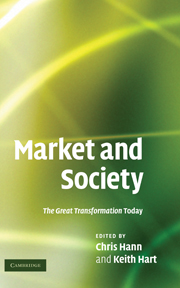Book contents
- Frontmatter
- Contents
- List of figures and table
- List of contributors
- 1 Introduction: Learning from Polanyi 1
- 2 Necessity or contingency: Mutuality and market
- 3 The great transformation of embeddedness: Karl Polanyi and the new economic sociology
- 4 The critique of the economic point of view: Karl Polanyi and the Durkheimians
- 5 Toward an alternative economy: Reconsidering the market, money, and value
- 6 Money in the making of world society
- 7 Debt, violence, and impersonal markets: Polanyian meditations
- 8 Whatever happened to householding?
- 9 Contesting The Great Transformation: Work in comparative perspective
- 10 “Sociological Marxism” in central India: Polanyi, Gramsci, and the case of the unions
- 11 Composites, fictions, and risk: toward an ethnography of price
- 12 Illusions of freedom: Polanyi and the third sector
- 13 Market and economy in environmental conservation in Jamaica
- 14 Embedded socialism? Land, labor, and money in eastern Xinjiang
- 15 Afterword: Learning from Polanyi 2
- Bibliography
- Index
11 - Composites, fictions, and risk: toward an ethnography of price
Published online by Cambridge University Press: 08 August 2009
- Frontmatter
- Contents
- List of figures and table
- List of contributors
- 1 Introduction: Learning from Polanyi 1
- 2 Necessity or contingency: Mutuality and market
- 3 The great transformation of embeddedness: Karl Polanyi and the new economic sociology
- 4 The critique of the economic point of view: Karl Polanyi and the Durkheimians
- 5 Toward an alternative economy: Reconsidering the market, money, and value
- 6 Money in the making of world society
- 7 Debt, violence, and impersonal markets: Polanyian meditations
- 8 Whatever happened to householding?
- 9 Contesting The Great Transformation: Work in comparative perspective
- 10 “Sociological Marxism” in central India: Polanyi, Gramsci, and the case of the unions
- 11 Composites, fictions, and risk: toward an ethnography of price
- 12 Illusions of freedom: Polanyi and the third sector
- 13 Market and economy in environmental conservation in Jamaica
- 14 Embedded socialism? Land, labor, and money in eastern Xinjiang
- 15 Afterword: Learning from Polanyi 2
- Bibliography
- Index
Summary
Introduction: fictions and prices
The topic of this chapter – popular understandings and social processes of commodity price formation – has engaged me for a long time, and weaves its way through much of my work, from urban food supply to bride-wealth to second-hand automobile spare parts. It has seemed, however, too vast to take on directly and there will never be enough time to address the economists systematically on an issue that they have owned for a hundred years. Only on an occasion such as presented here, an invitation to review aspects of economic anthropology in light of a re-reading of Polanyi's (1944) The Great Transformation, has it seemed worth placing some thoughts into circulation. Those thoughts focus on how price is produced, presented, revealed, and concealed as a composite as distinct from a singular amount.
In all but catastrophic inflationary conditions, market participants are describing and judging absolute and relative prices all the time. Allusion to the composition of prices, through distinct but converging processes, has recently become one of the regular reference points in popular and even corporate justificatory discourse. This is a departure from concepts that take price “as a whole,” such as “worth” in a religious register, and the intersection of supply and demand (scarcity and desire) in the marginalist neoclassical register. Although the use of a composite idiom seems on the rise at present, the component categories in circulation actually refer back to classical theory: to returns to land, labor, capital, and the state.
- Type
- Chapter
- Information
- Market and SocietyThe Great Transformation Today, pp. 203 - 220Publisher: Cambridge University PressPrint publication year: 2009
- 76
- Cited by



